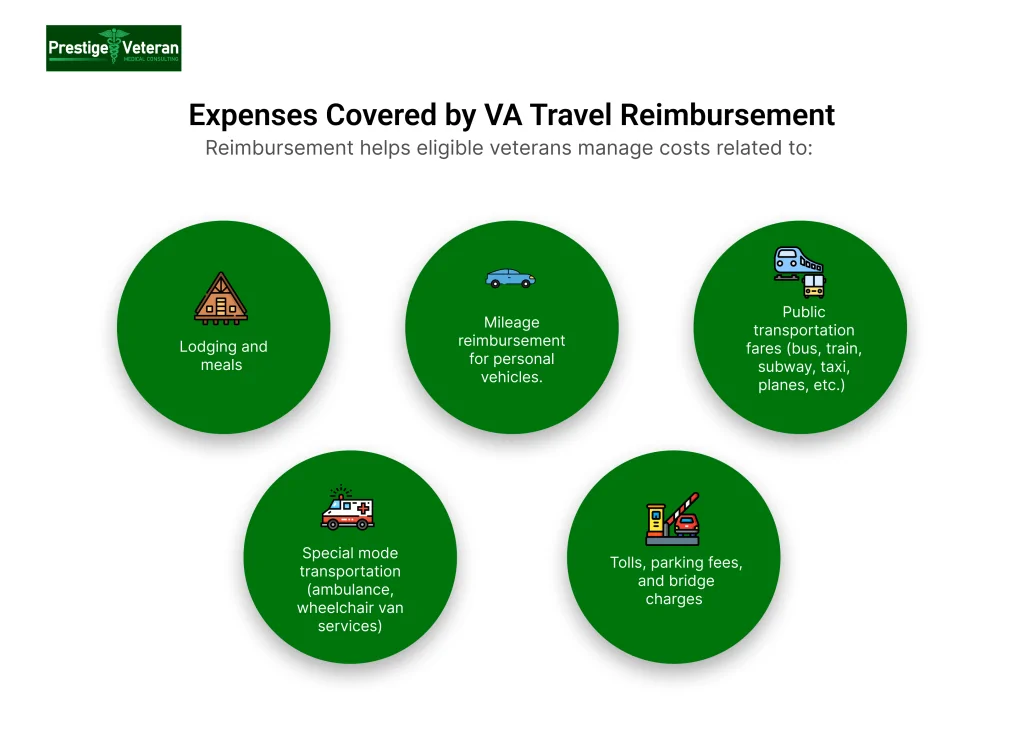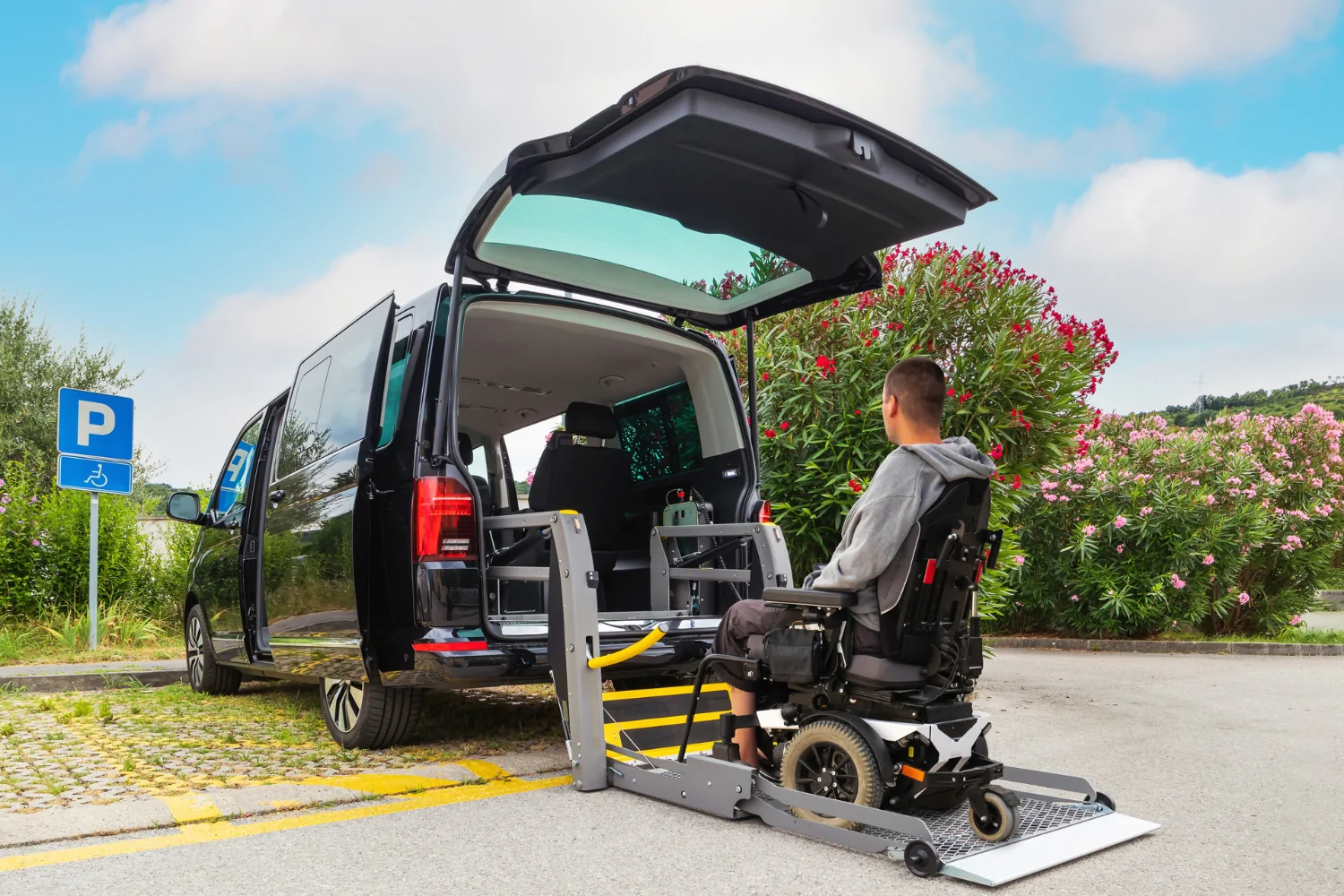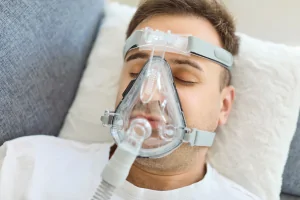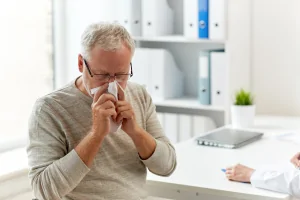For many veterans, traveling to VA-approved healthcare appointments can be both costly and inconvenient. The Department of Veterans Affairs (VA) offers the Beneficiary Travel Program, which provides financial assistance for transportation costs to and from VA-approved medical appointments.
Whether you’re driving your own vehicle, using public transportation, or requiring special accommodations, knowing about this benefit can make a significant difference for disabled veterans. In this guide, we’ll walk you through everything you need to know about VA travel reimbursement, from eligibility requirements, covered expenses to filing a claim successfully.
Table of Contents
What is VA Travel Reimbursement?

The VA Beneficiary Travel Program provides reimbursement for transportation costs incurred by veterans and caregivers while traveling to VA-approved medical appointments. This includes travel to VA hospitals, outpatient clinics, or VA-authorized community care providers.
Reimbursement helps eligible veterans manage costs related to:
- Mileage reimbursement for personal vehicles driven to and from medical appointments
- Public transportation fares (bus, train, subway, taxi, planes, etc.)
- Tolls, parking fees, and bridge charges
- Lodging and meals (for long-distance medical travel)
- Special mode transportation (ambulance, wheelchair van services, or other medical transport)
In fiscal year 2021, the Veterans Health Administration (VHA) spent over $1.3 billion on the Beneficiary Travel Program.
Who Administers the Program?
The VA Office of Finance and Travel Office manages the Beneficiary Travel Program. This initiative is part of a broader set of VA benefits aimed at reducing barriers to healthcare for veterans. All claims are processed through the Beneficiary Travel Self-Service System (BTSSS) or manually at VA medical centers.
Eligibility Requirements for Veterans Travel Pay
How Veterans Can Become Eligible
To qualify for VA travel pay reimbursement, a veteran must be traveling to a VA health facility or VA-approved non-VA care facility for a scheduled medical appointment.
At least one of the following must also be true:
- You have a VA disability rating of 30% or higher.
- You’re traveling for treatment of a service-connected condition (even if your VA disability rating is below 30%).
- You receive a VA pension.
- Your income is below the maximum annual VA pension rate.
- You can’t afford to pay for travel, as per VA financial guidelines.
- You’re traveling for a scheduled VA claim exam (C&P exam) or VA-approved transplant care, or to obtain a service dog.
How Caregivers Can Become Eligible
Non-veterans may also qualify for VA travel reimbursement under certain conditions. Caregivers or attendants accompanying a veteran for medical appointments may also qualify for travel pay if they meet at least one of these criteria:
- They are a family caregiver under the National Caregiver Program and are traveling for training or to support the veteran’s care.
- They are a medically required attendant traveling with the veteran.
- They are a transplant donor or support person.
The VA may also reimburse allied beneficiaries, such as veterans under foreign government programs or beneficiaries of other federal agencies, if travel is pre-approved.
What Travel Expenses Are Covered?
The Veterans Benefits Administration provides reimbursement for certain travel expenses related to medical care. This includes mileage, public transportation, tolls, and special accommodations for eligible veterans. Below are the types of reimbursable travel costs:
Mileage Reimbursement
Veterans using a personal vehicle for approved medical travel are eligible for reimbursement at 41.5 cents ($0.415) per mile (as of 2024). According to a VA Health Care report, the number of mileage reimbursement claims submitted by veterans was approximately 10.3 million in fiscal year 2023.
Public Transportation
The VA reimburses the costs of public transit fares, including:
- Buses, ferry, or light rail
- Trains and subways
- Taxis and ride-sharing services (e.g., Uber, Lyft)
- Planes
Parking, Tolls, and Bridge Fees
Veterans can receive reimbursement for parking, tunnel tolls, and bridge fees. However, receipts must be provided to qualify.
Special Mode Transportation
Some veterans require medically necessary specialized transportation, such as:
- Ambulances
- Wheelchair-accessible vans
- Other approved medical transport services
To qualify for special mode transportation reimbursement, the following criteria must be met:
- The veteran meets general VA travel eligibility requirements.
- A VA health care provider has determined that specialized transport is necessary.
- The VA pre-approves the travel (except in emergencies).
Lodging and Meal Allowances
Veterans traveling long distances for medical care may qualify for reimbursement of lodging and meals if an overnight stay is required. The VA provides:
- Lodging reimbursement up to 50% of the local government employee rate.
- Meal reimbursements at VA-approved rates.
The VA will not cover lodging or meal expenses if the veteran makes unapproved stops or takes a longer, indirect route to a VA or VA-authorized medical facility.
Monthly Deductibles for Travel Pay
Before receiving reimbursement for travel expenses, veterans must first pay a deductible. The current deductible rates are $3 for a one-way trip, $6 for a round-trip, and a maximum of $18 per month.
Once the veteran pays the $18 monthly cap, the VA covers all approved travel costs for the rest of that month. This deduction is legally required to help fund medical travel for other veterans. The VA may waive this deductible in certain cases, for example:
- Veterans with low income
- Traveling for a scheduled Compensation and Pension (C&P) exam
- Receiving benefits such as VA pensions
- Service-connected for disability compensation
If you believe you qualify, request a waiver through your local VA Beneficiary Travel Office.
How to Apply for VA Travel Reimbursement
Veterans and caregivers can submit travel claims online, by mail, or in person.
Step 1: Gather Required Documents
Before submitting your VA travel claim, ensure you have the following:
- Proof of travel (such as a medical appointment confirmation).
- Mileage details if using a personal vehicle.
- Receipts for approved public transit, parking, tolls, lodging, or meals (if applicable).
Step 2: Choose Your Submission Method
There are three ways to file a VA travel reimbursement claim:
1. Online Through BTSSS
The Beneficiary Travel Self-Service System (BTSSS) is the fastest option to file your claim. Follow these steps to submit a claim online.
- Visit the VA’s AccessVA portal.
- Log in with ID.me, Login.gov, DS Logon, or My HealtheVet.
- Navigate to “My Appointments” and select “Create a Claim.”
- Submit your travel claim, including appointment details and receipts.
Usually, you will receive VA travel reimbursement within 3-5 business days via direct deposit.
2. In-Person or By Mail
Veterans can also submit VA Form 10-3542 in person at their VA medical facility’s Beneficiary Travel Office or mail it to the VA center where they received care.
If filing by mail, ensure you keep copies of your receipts and documents for record-keeping.
Step 3: File Your Claim Before the Deadline
VA travel claims must be submitted within 30 days of the travel date or the date you become eligible for reimbursement. A separate claim is required for each appointment.
Why Proper Medical Documentation Matters in VA Travel Claim
The VA reviews travel claims based on medical necessity, requiring veterans to provide clear evidence that their travel was essential for approved medical care at a VA facility or an authorized provider. Hence, those who require special transportation services must provide supporting medical evidence to justify the travel pay.
A nexus letter written by a qualified healthcare professional can support your claim by establishing a direct connection between your service-related condition and the need for medical travel. This independent medical opinion is especially useful for:
- Establishing a service connection for travel reimbursement.
- Providing supporting evidence for special mode transportation claims.
- Strengthening appeals if a claim is denied.
For example, a physician’s statement supporting a veteran with a service-connected spinal cord injury (rated at 70%) can help their claim to secure VA travel reimbursement by documenting the medical necessity of wheelchair-accessible transportation.
Moreover, ensuring the submission of all mileage logs, appointment confirmations, and VA Form 10-3542 increases your chances of securing rightful travel benefits. Veterans with service-connected disabilities should also verify if their treatment qualifies for full reimbursement under VA guidelines.
For expertly written nexus letters, consult an independent provider like Prestige Veteran specializing in VA claims.
Rules and Limitations to Keep in Mind
VA travel reimbursement helps eligible veterans cover transportation costs for medical appointments, but certain restrictions apply, such as:
- Proximity Requirements: Travel must be to the nearest VA health facility that provides the necessary care. If a veteran chooses a farther facility without prior approval, the additional costs may not be reimbursed.
- Free Transportation Services: Veterans using services like Disabled American Veterans (DAV) or VA Veterans Transportation Service (VTS) can only claim reimbursement for travel between their home and the designated pick-up/drop-off location.
- Filing Deadline: Reimbursement claims must be submitted within 30 days of the appointment.
- Emergency Travel: Special transportation (ambulance, wheelchair van) requires pre-approval unless it is an emergency. In emergency cases, the VA must be notified within 72 hours for potential reimbursement.
- Lodging and Meals: Reimbursement for meals and overnight lodging may be available if the medical condition or travel distance necessitates it, but pre-approval is typically required.
Understanding these considerations ensures veterans can navigate the VA travel reimbursement process effectively and avoid unexpected costs.
Tips for Maximizing Your VA Travel Benefits
Veterans travel pay ensures you receive full reimbursement for medical-related transportation costs. Follow these key tips to maximize your chances of receiving VA travel benefits.
- Track your mileage and save all receipts for tolls, lodging, and public transportation.
- File your claim within 30 days to avoid missing reimbursement deadlines.
- Use BTSSS for faster claim processing.
- Check eligibility for higher reimbursement rates if you have a service-connected disability.
- Travel to the nearest VA facility providing the required care to ensure full reimbursement.
- Get pre-approval for special mode transportation unless it’s an emergency.
- Appeal denied claims with supporting documents, such as a strong medical nexus letter.
- Stay informed on policy updates to ensure you receive the full benefits available.
Frequently Asked Questions (FAQs) Answered
What is the VA’s current mileage reimbursement rate for travel?
The VA reimburses mileage at a rate of 41.5 cents ($0.415) per mile as of 2024 and covers public transportation, tolls, lodging, and meals for eligible veterans and caregivers.
How do I submit a VA travel reimbursement?
You can submit a VA travel claim online through BTSSS, in person at a VA Beneficiary Travel Office, or by mailing VA Form 10-3542 to the appropriate VA center.
What is the minimum distance for VA travel pay?
There is no minimum distance requirement. However, the Government Accountability Office (GAO) found that after the deductible, veterans must travel at least 15 miles round trip for reimbursement and 25 miles to have fuel costs fully covered.
Can I get reimbursed for travel to a non-VA health facility?
Yes, but only if the VA approves the care in advance or qualifies as emergency care under VA guidelines.
What if I travel with a caregiver?
If a caregiver meets VA requirements as an attendant, they can be reimbursed for mileage, lodging, and meals.
How to check the status of my reimbursement claim?
You can check the status of your reimbursement by logging into the BTSSS or by contacting your local VA facility’s travel office.
Can I appeal a denied VA travel claim?
Yes, appeals can be submitted with additional medical evidence or supporting documents.
For more detailed assistance, visit VA.gov or contact the Beneficiary Travel Call Center at 855-574-7292.
Conclusion
VA travel reimbursement is an essential benefit that ensures veterans can access the healthcare they need without financial hardship. Understanding the eligibility requirements, covered expenses, and the claim filing process can help veterans and their caregivers take full advantage of this program. If you need assistance with VA claims or supporting medical documentation, consider reaching out to Veterans Service Organizations (VSOs) or veterans advocacy groups. By staying informed and proactive, you can make sure you receive the benefits you’ve earned through your service.
Also read: Foreign Medical Program: Healthcare Benefits for Veterans Overseas
At Prestige Veteran Medical Consulting, a veteran-owned company, we specialize in Independent Medical Opinions (IMOs) known as Nexus letters.
Our purpose is to empower YOU, the veteran, to take charge of your medical evidence and provide you with valuable educational tools and research to guide you on your journey.
Understanding the unique challenges veterans face, our commitment lies in delivering exceptional service and support.
Leveraging an extensive network of licensed independent medical professionals, all well-versed in the medical professional aspects of the VA claims process, we review the necessary medical evidence to incorporate in our reports related to your VA Disability Claim.
Prestige Veteran Medical Consulting is not a law firm, accredited claims agent, or affiliated with the Veterans Administration or Veterans Services Organizations. However, we are happy to discuss your case with your accredited VA legal professional.















